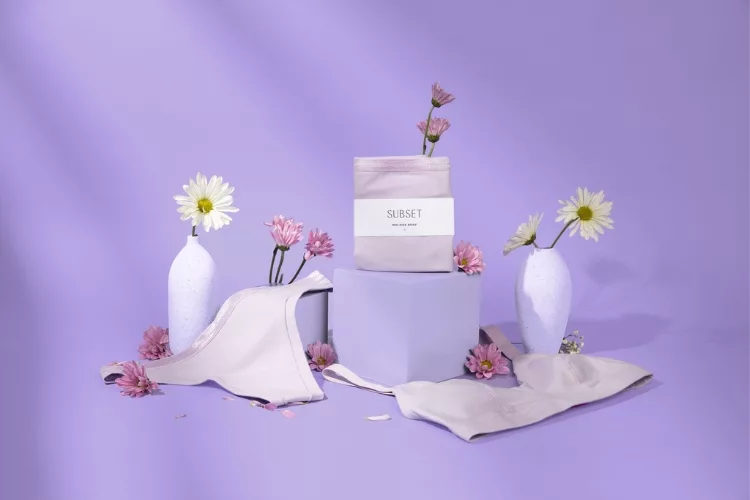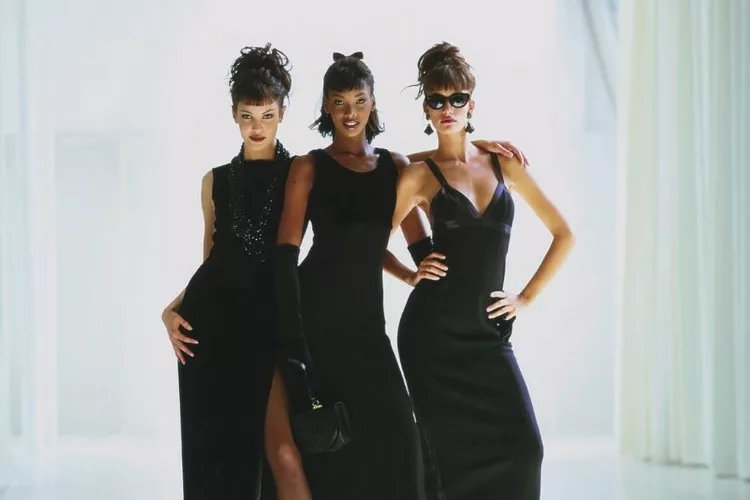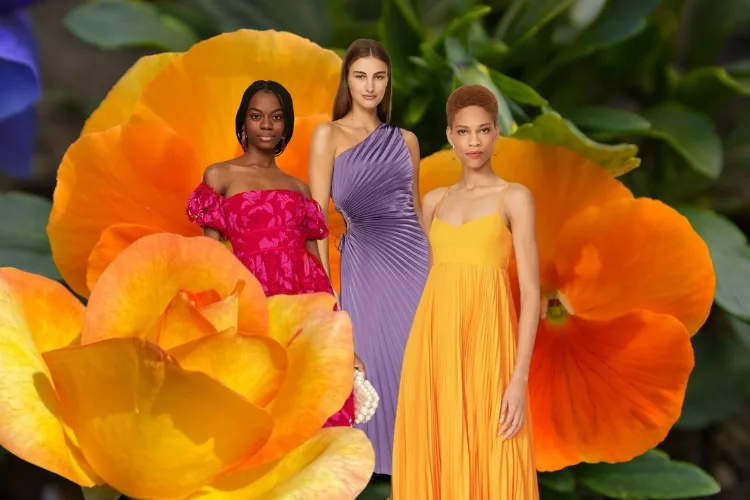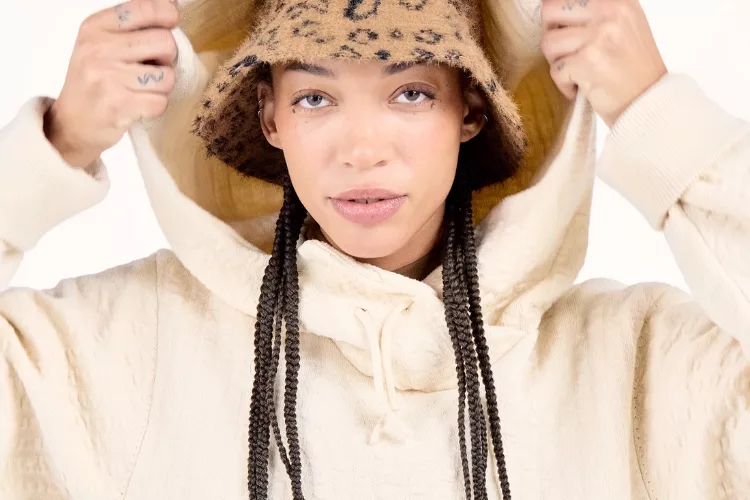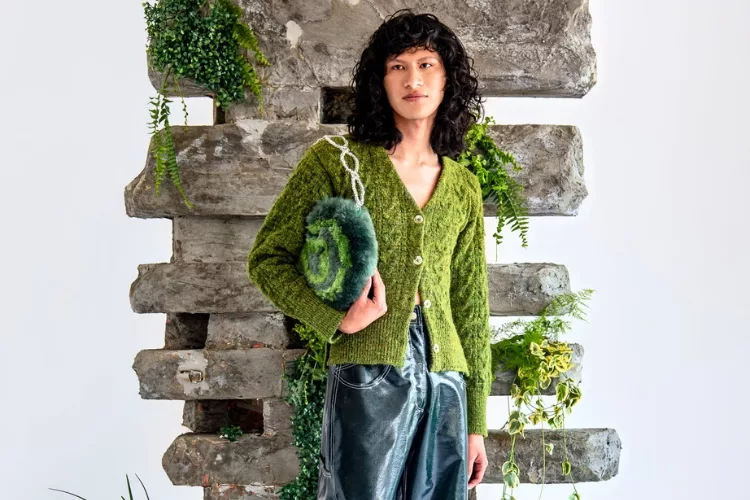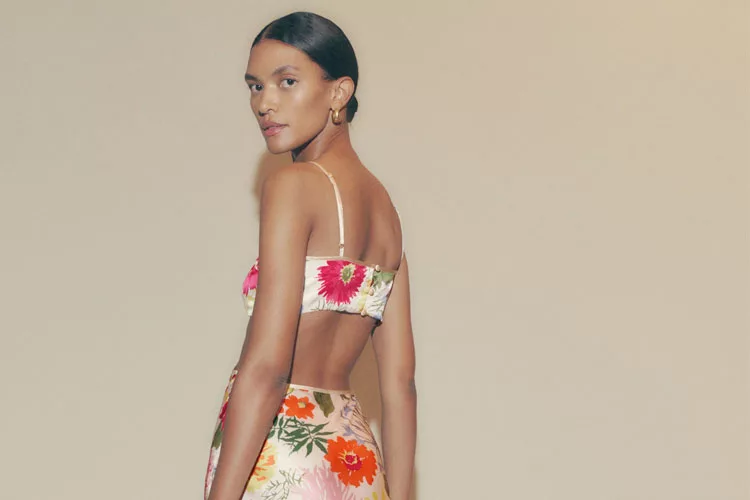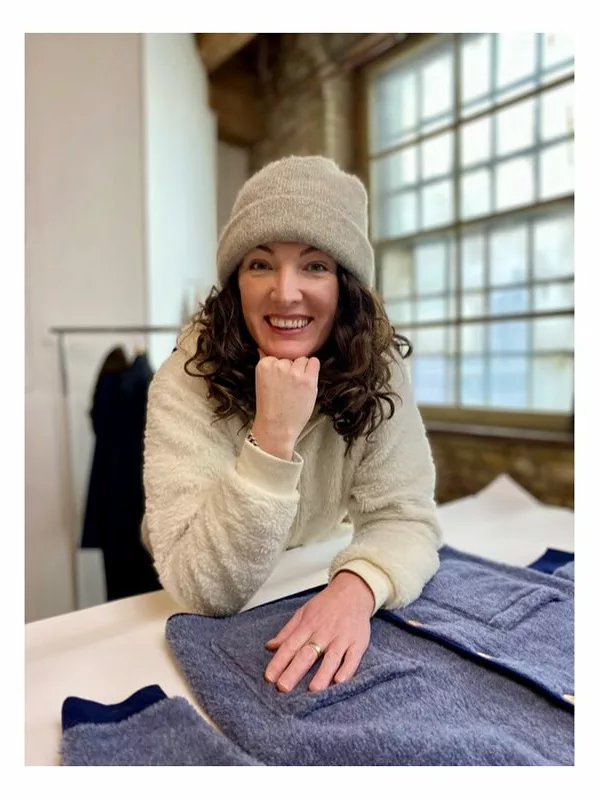
Caroline Priebe never wanted to wrap herself or her young daughter in plastic, yet, like many, she found herself ensnared in a world where cozy clothing often meant wearing synthetic materials. Over Zoom, the sustainable fashion consultant turned eco-entrepreneur shares,
“We’ve figured out how to make fossil fuels really soft, but at what cost?”
Her concern isn’t just theoretical; it’s deeply personal, rooted in the health of her daughter growing up amidst an escalation of microplastic pollution.
This alarming reality led Priebe to innovate with Driftless Goods, a pioneering outdoor apparel brand striving for a plastic-free existence.
“The use of plastic has exponentially increased. It’s everywhere – in our water, our rain, and accumulating in our bodies,”
Driftless Goods’ hallmark is its all-natural fleece alternative: a line of wool fleece apparel for all ages, defying the industry norm of polyester.
Her latest creations embody her vision: a line of 100% merino wool fleece hoodies and a reversible, and classically silhouetted jacket. The latter, available for pre-order, is made from 100% regenerative merino wool on one side and organic cotton twill on the other, it stands as a testament to a plastic-free future.
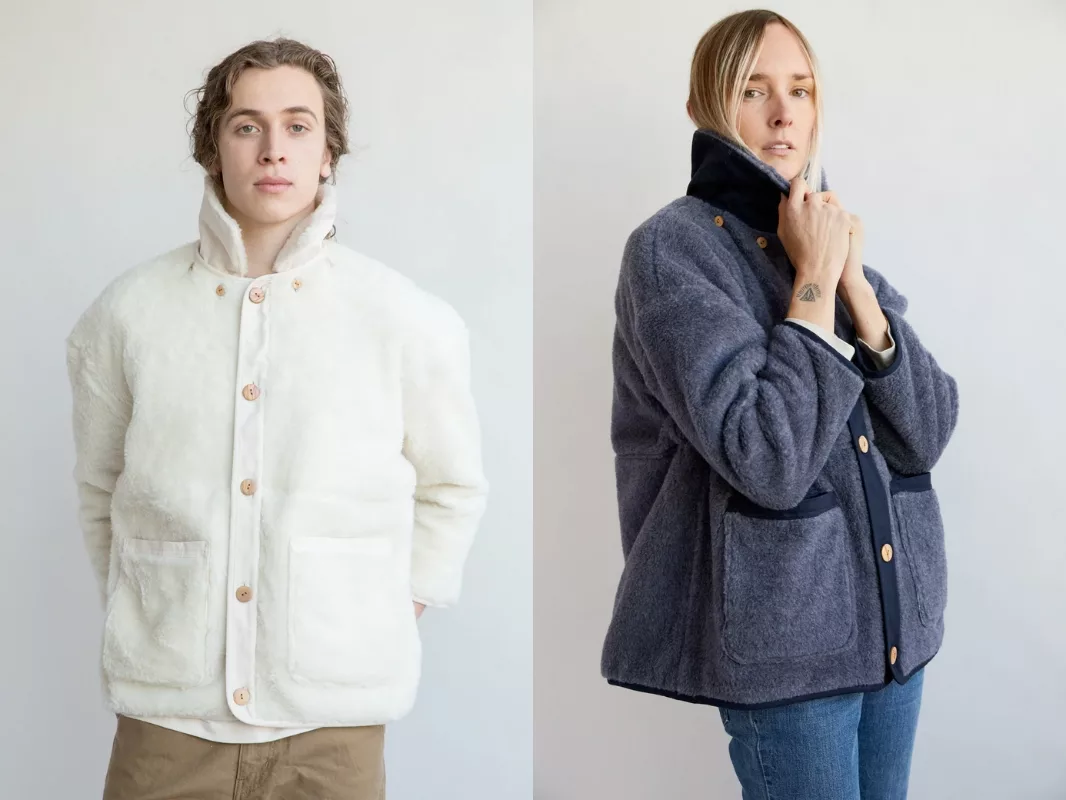
As Priebe puts it, “People don’t know they’re wrapping themselves in plastic.” With Driftless Goods, she’s not only changing how we dress but also challenging us to rethink our relationship with the very fabrics that keep us warm and comfortable.
Why wool?
Wool is the original and superior performance fiber, Priebe share on her website, expanding on all the reasons it became her go-to for a fuzzy and sustainable alternative to polar fleece. It might surprise you to learn that sheep can be part of the natural carbon cycle! When managed by ranchers that use regenerative practices, misplaced carbon is sequestered in the soil (fighting climate change).
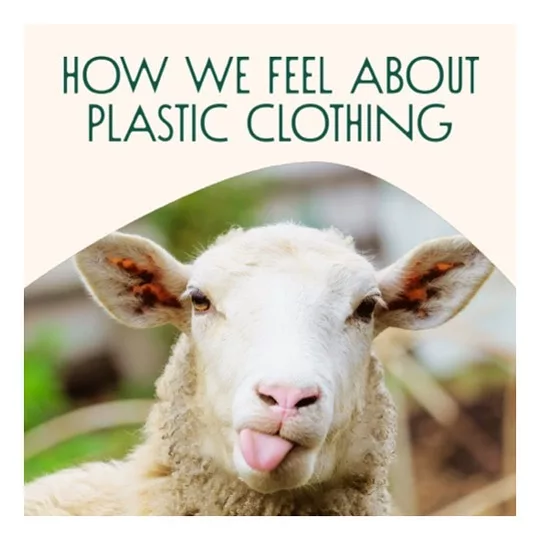
Beyond that, wool
- is naturally flame retardant
- is biodegradable – which makes Driftless Goods clothing fully biodegradable and compostable
- is currently one of the easiest materials to recycle
- doesn’t retain odor and requires very little washing
- resists wrinkling
- is thermoregulating – it keeps a wearer warm and provides a cooling effect which prevents overheating during high intensity exercise or unexpected warm weather
Driftless Goods ethically sources Shaniko wool, which is both Nativa™ Regen and RWS certified. Nativa, a Regenerative Agriculture program, collaborates with Shaniko to ensure ecologically responsible sheep farming, fair compensation for ranchers, and humane treatment of animals. This focus on natural fibers makes the dyeing process inherently less toxic compared to synthetics and the garments are locally crafted in New York City’s Garment District and Massachusetts.
A Truly Local Supply Chain
Priebe champions local production, acknowledging the challenges in the post-NAFTA US textile landscape. “NAFTA gutted our textile manufacturing and garment manufacturing infrastructure. I feel really lucky that I was able to do domestic production” she says.
She’s committed to supporting mills and artisans globally in a product-specific manner, avoiding the inefficiencies of disjointed supply chains. “Let’s say I’m making alpaca sweaters. It doesn’t make sense to do it in the States. You do that in Peru, where there’s a regional supply chain. I wouldn’t buy alpaca in Peru, send it to Spain to be processed and then Turkey to be knit.” she explains, emphasizing the practicality and ethics in local production.
“I think that’s how most small independent brands do it. We’re not just chasing the lowest cost vendor all the time. If you want to make quality garments, you go to the people that know how to do it,” she says, explaining how independent brands get to be the change that the bigger, corporate fashion industry wishes it could see and be.
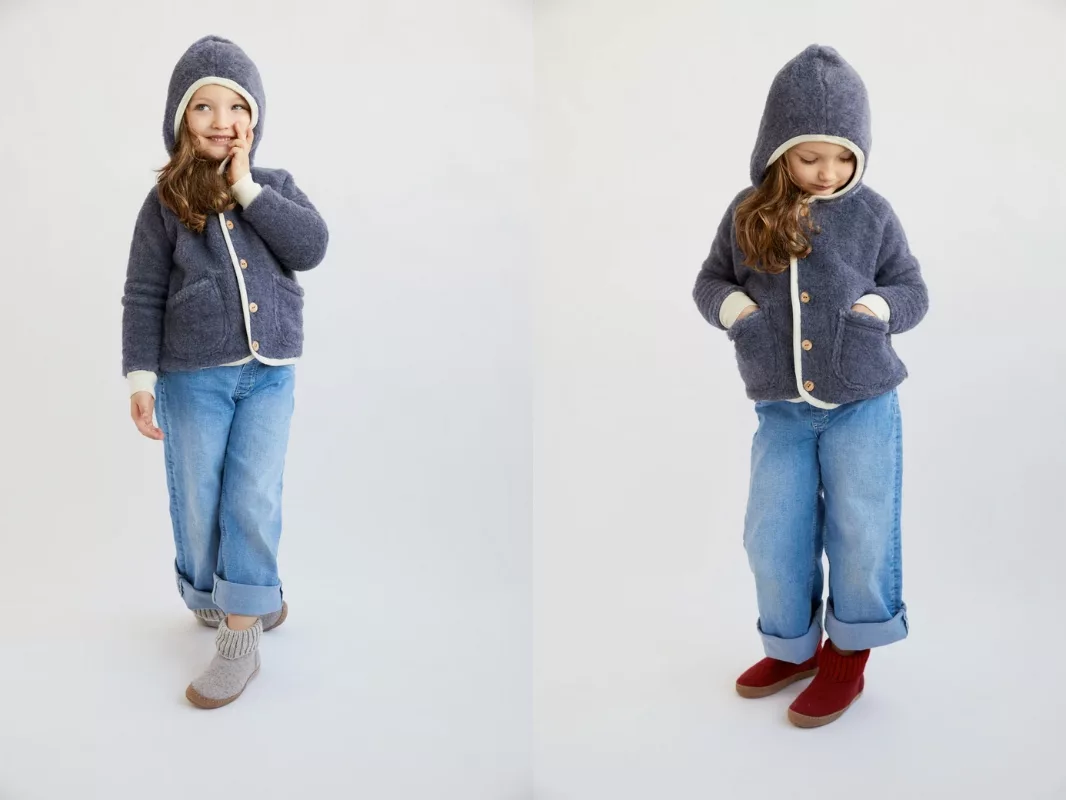
Empowering Small Brands
Starting a business with these principles is challenging, but Priebe sees independent companies as key players in sustainable change.
“They can create new business models rooted in sustainability, because they don’t have fiduciary duty*, so they can take the risks, they can build their companies however they want. And if they want to create their business for impact, they can prioritize that,” the designer says.
She aspires to establish a supply chain that demonstrates sustainable practices, something she believes larger companies struggle with due to their established, rigid systems.
“[Public companies] legally have to show compound growth infinitely. It’s so crazy. Otherwise shareholders can sue the board. Their business models are not compatible with planetary boundaries: nothing can grow infinitely. And the pursuit of endless growth requires exploitation of both our natural resources and labor.”
Consumer Choice and Long-Term Value
Conventional PET-based polyester fleece is cheaper than Priebe’s products. But that’s because no one is currently being made to pay for what Priebe calls the “externalities” of producing textiles and garments via fossil fuels.
She points out that Life Cycle Assessments for cotton begin at the farming stage, whereas those for polyester overlook the initial environmental impact of fracking. Damage that also includes health costs of their material production, such as their emissions, the eventual cost of cleaning the air, the effect on biodiversity in the air, any waste byproducts, and the health costs to the people in the supply chain.
Legislation requiring companies to be held accountable for environmental damage is the only way to slow this down.
“We have to make fossil fuel-derived textiles too expensive to use.”
As people begin to understand this full picture Priebe hopes they’ll support companies like Driftless Goods who are going against the grain. “They can choose to vote with their dollars. They can choose how to build their wardrobes and how they choose to take care of themselves, physically.”
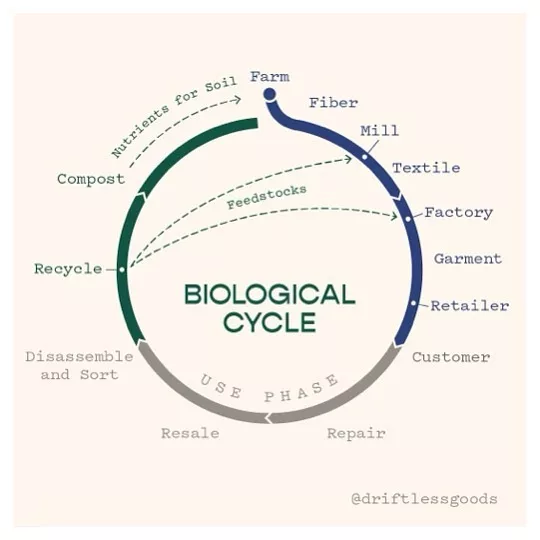
Designing with the end in mind
“My goal is to start out as a circular brand, utilizing the biological cycle. My aim — and we’ll see how successful I am at this — is that everything can return safely back to earth as nutrients.”
“Natural fibers, like wool, can be used as mulch or fertilizer at their end of life,” she says.
Currently, she’s working on how to deal with any post-industrial waste. “Wool, especially if undyed or natural, can literally go straight into the ground as valuable mulch or fertilizer. It doesn’t even have to be pelletized, you can just mix it with mulch,” she says As an independent entrepreneur, Priebe feels empowered to pursue these environmentally friendly practices.
“I can do [all this], because I’m a private company, and I’m a weirdo, and I like to think about worms.”
*In law, finance, and investing, fiduciary duty demands that a company that receives investment from shareholders will put the financial wellbeing of the company — and therefore the returns on investment to said shareholders — above pretty much all else.
–Anne Elizabeth Whiting
Related Articles
- On Our Radar: NFW’s Plastic-Free Materials Revolution
- 10 plant-based vegan leather bags for literally any and every occasion
- It’s Time to End Our Toxic Love Affair with Synthetic Clothing.
- What is regenerative fashion? Here are our fave brands
- Creative + Innovative designers working with natural fibers
- Embracing the Future of Fashion: The Bevans 360 Hoodie and Evrnu’s Sustainable Vision

